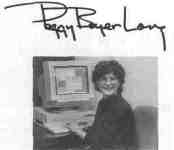
An essayist who 'plays the role
of the citizen on a larger stage'
by Peggy Boyer Long

An essayist who 'plays the role
of the citizen on a larger stage'
by Peggy Boyer Long
Here in Springfield you can almost hear the page turning. The state has a new governor, and another chapter in Illinois political history has begun.
In recent weeks, workers have been moving furniture in the Capitol, affixing name plates and setting up phone lines. And Statehouse reporters have been racing to document the day- to-day details of a new administration, tracking the selection of department heads, analyzing relative executive styles and assessing the relationship between campaign promises and government realities.
The transition is well underway.
But Illinois hasn't seen this process in almost a decade. And we wondered what it is really like — for a governor who has two months to choose his team, for a new department head who inherits an agency that was in place long before she arrived and for the lifers in the cubicles who have seen front-office politicos come and go. A full account would surely entail more than a Who's Who.
Indeed, it's sometimes easier to see things from a distance. So we asked contributing editor James Krohe Jr. to take a look at the history, and the complex nature of Illinois' political transitions.
Jim, a native Illinoisan who now lives in Oregon, talked to members of previous transition teams, to incumbent agency directors and to career state employees who have weathered past political storms. His two-part essay began last month — see January, page 14 — and concludes in this issue, beginning on page 16.
As we expected, Jim had some surprising assessments. Despite the prevailing mythology, state government managers are of passing quality;it's in a governor's urgent interest to find the best people to work for him;and political loyalty is not a bad criterion for choosing a Cabinet. As for the job of running an agency during change? Sometimes a director's main task is simply keeping employees calm. "Yet, for all the hooha, nothing really seems to change much," Jim says.
It's likely many of our readers are familiar with Jim Krohe's writing. His byline has appeared in more than a dozen national magazines and newspapers, including The Nation, Reader's Digest, The New York Times Book Review, the Chicago Tribune, the Wall Street Journal and the Chicago Reader. And the spunky Springfield-based weekly paper where he got his start — and found his voice — Illinois Times.
|
|
For some, reading one of Jim's essays may be a white-knuckle experience. But if that assessment, as he argues, makes what he does sound too exciting, we can say his opinions have sparked some strong reactions. "In print, I'm the kind of person people instinctively shy away from when they meet them at parties," he says. "Simply put, I annoy people." But, then, Jim has never expected readers to agree with him. ("Over time, I didn't always agree with myself") And neither have we. Rather, Jim's aim is to explore ideas and provoke thought, "to consider out loud public issues of relevance to the day." And, "to play the role of the citizen on a larger stage." |
One with eclectic interests, certainly. And a prodigious intellectual range. In the decade and a half Jim has written for Illinois Issues, he has examined such diverse topics as soil conservation and child welfare. He has explored the significance of place names and the cultural meaning of bribery. And always, he has skewered convention.
And that, after all, may be his most useful contribution to our readers.
4 February 1999 Illinois Issues